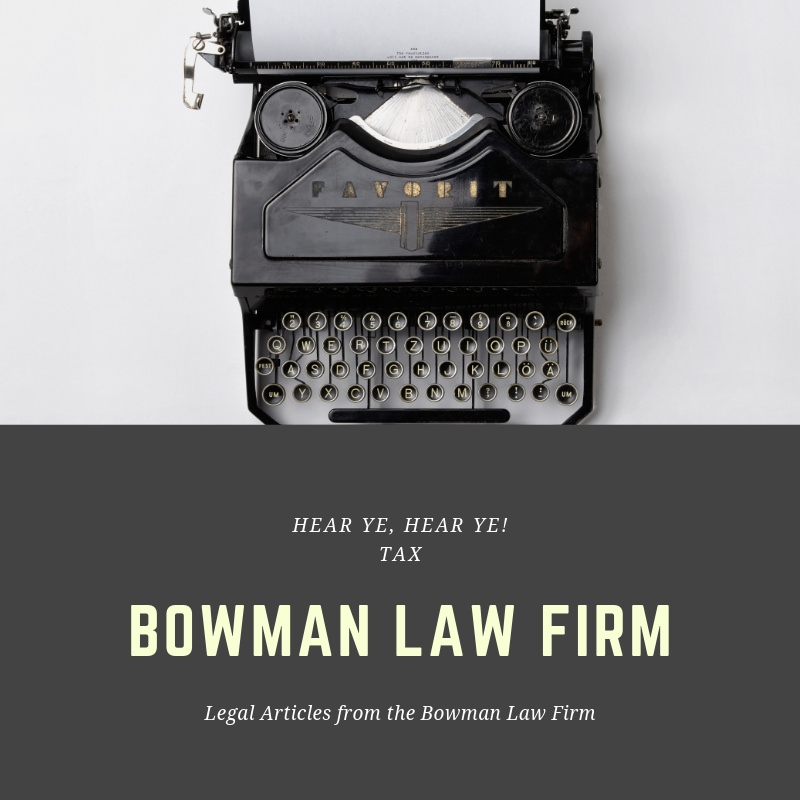
Experienced-Diligent-Effective
Articles and News
IRS List of Top Taxpayer Scams
The Internal Revenue Service has released its annual list of tax scams. A summary of the list, called the "Dirty Dozen" is provided in this article.
Tax Returns and Health Insurance
The IRS was prepared to require tax filers to indicate on line 61 whether they and their family had health coverage during 2016. If not, taxpayers are subject to a penalty.
IRS Collection Fast Track Mediation
The purpose of the mediation is to resolve disputes in the early stages of the collection process and within 40 days after the mediation application is accepted by the IRS. In order to be accepted into the process, taxpayers must make a good faith effort to resolve matters with the IRS collection officer followed by a conference with the officer's manager. Acceptance into the mediation process does not mean that taxpayers can't pursue other options if mediation doesn't resolve their case.
Internal Revenue Service Offshore Bank Account Enforcement
The IRS along with the DOJ has been aggressively pursuing offshore account holders to disclose their overseas bank accounts before it's too late. There are significant penalties for holding accounts in certain foreign banks. However, in an effort to encourage account holders to disclose their accounts, the IRS started the Offshore Voluntary Disclosure Program (OVDP) and the streamlined procedures enable taxpayer to meet their tax obligations while limiting the potential penalties for continued non-compliance.
Multiple Businesses and the IRS
A recent decision by the Tax Court should serve as a warning to people that own multiple businesses but don't always "respect the corporate formalities" associated with each business entity. If you own more than one business and sometimes have Company A pay the expenses of Company B, or perhaps task an employee of Company A to do things for Company B, the IRS may deny your deductions.
IRS Statute of Limitation on Collecting Taxes
For some the only hope of relief from unmanageable federal tax debts may be the statute of limitations on collection. In theory, the IRS has only 10 years from the date of assessment to collect. However, this 10-year limitation has many exceptions, waivers and overlapping extensions such that in all but the simplest of cases computing the correct “collection statute expiration date” is quite difficult.
Private Collection Agencies Working for the IRS
Private collection agencies are now working for the IRS. In fact, for some hard to collect bills, the law now requires—rather than just permits—the IRS to use private collectors. Many people think that having the IRS farm out collection work to private contractors is a bad idea. Here are 10 things you should know:
IRS Can Revoke/Deny Passports
The IRS can deny and/or revoke passports. This is new ground in tax enforcement for the IRS. It will make it harder for taxpayers with serious tax problems to flee the country. However, we think Congress was far more concerned with getting a delinquent taxpayer's attention. Here's why:
IRS Criminal Investigations--How Initiated
Criminal Investigations can be initiated from information obtained from within the IRS when a revenue agent (auditor) or revenue officer (collection) detects possible fraud. Information is also routinely received from the public as well as from ongoing investigations underway by other law enforcement agencies or by United States Attorneys offices across the country.
IRS Garnishment of Social Security Benefits
Social Security benefits are eligible for levy by the IRS.
Affordable Care Act--Loss of Health Insurance Subsidies
Under federal rules, anyone who receives an insurance subsidy must file a tax return to verify that the person was eligible and received the proper amount of financial assistance based on household income. There is the risk of loss of health insurance subsidies for failure to file tax return.
The Affordable Care Act and Taxes--What New for 2015
Affordable Care Act, Taxes, Fines and Employer Mandates
IRS Tax Liens
There is a way to make tax liens disappear from your credit reports completely, and quickly, though. Unfortunately, not all taxpayers who are dealing with this problem know about it.
Home Office Tax Deduction and Safe Harbor
Self-employed individuals and employees who work out of their home are allowed to deduct business expenses relating to part of their home.
Alabama Tax Fairness Act
Alabama has become the 32nd state with an independent tax appeals process.
Net Investment Income Tax
The NIIT applies at a rate of 3.8% to certain net investment income of individuals, estates and trusts that have income above the statutory threshold amounts.


















